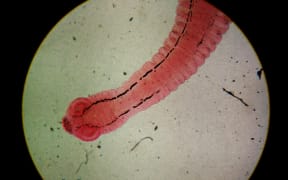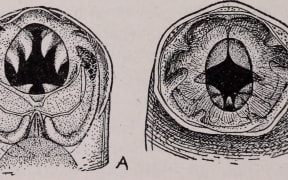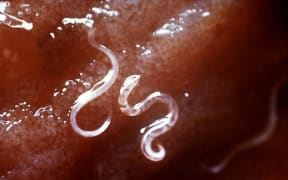
A magnified hookworm, showing its mouth - 'perfectly shaped' to latch onto its human host, gastroenterologist Tom Mules says. Photo: Alex Loukas
Ten minutes after gauze is applied to his arm, Christian Williams feels an unusual pinching sensation.
"I didn't feel them again for another month or so," Williams says.
The "them" he's referring to are hookworms trapped under the gauze, and the mild rash he is left with marks the beginning of an epic journey for the 30 larvae the Malaghan Institute has infected him with.
A touch of awe creeps into Malaghan Institute gastroenterologist Tom Mules's voice when he talks about a human hookworm's life cycle. The parasite is an "amazing organism," he says, built to only infect humans and with a "perfectly shaped mouth" to latch onto human anatomy.
To get into the body, "they've got these heat sensors that can find their way to your bloodstream." The pinching sensation Williams felt is a result of the hookworms detecting blood and swiftly burrowing under his skin.
From the bloodstream they wend their way to the lungs and crawl up the windpipe. "Without even knowing it, you swallow them, and they end up going down through your stomach," Mules says.
Passing through one of the harshest environments in the body, the tiny worms survive stomach acid to reach the small intestine. This is their home for the rest of their lives, which lasts at least four years. Here they latch onto and graze on villi - the small finger-like structures that line the intestine - and "cruise around looking for other hookworms of different sex that they can mate with".
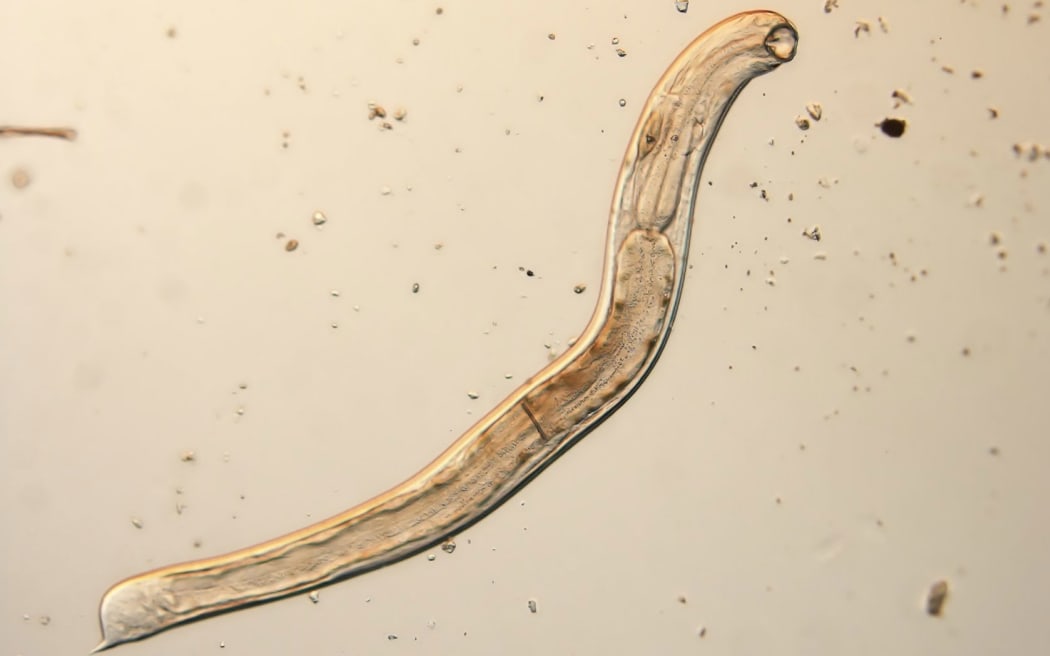
The Necator americanus hookworm has evolved to only infect humans Photo: Supplied
Hookworms can lay thousands of eggs a day, but these are expelled in faeces and don't hatch inside your body. In places with plumbing and where shoes are commonly worn these expelled eggs are doomed, but in countries with poor sanitation people walking barefoot can pick up more larvae. This is how the parasite has earned its bad rap: when people are continually picking up more larvae they can end up hosting hookworm populations in the thousands, potentially causing anaemia and malnutrition.
So why is Williams voluntarily playing host to them?
It's because plumbing and shoes may have created a different set of health issues. There's a "hygiene hypothesis" that when countries improve sanitation and children grow up in more sterile environments, they also become more susceptible to allergies. The "old friends hypothesis" goes further, suggesting that erasing parasites like hookworms, which humans evolved with, leads to overly sensitive immune systems.
One school of thought is that there might be an infection sweet-spot, where just the right number of hookworms hanging out in your small intestine, cruising for sex and sucking your blood, might be an infection with benefits for both host and hookworms. Hit this balance and the relationship might be more symbiotic than parasitic.
It's a theory with a community of DIY advocates who share hookworm larvae and stories. Many say that after infecting themselves, their health improves dramatically and conditions plaguing them for years reduce or vanish.
The study Williams joined looks at how a small number of hookworms affect healthy people. His sister has Crohn's disease - just one of the conditions from allergies to asthma, multiple sclerosis, celiac disease and diabetes that hookworms might help with - so Williams is happy to nurture a colony of hookworms to move research along. Plus, he's a little curious.
Aside from some nausea and the occasional sharp pain felt during a week which he assumes marks the arrival of the hookworms in his small intestine, he's blissfully unaware of his guests. "I wouldn't have probably even noticed or known what I was feeling if it wasn't for being part of the study," he says. A tiny camera encased in a pill-like capsule he swallows as part of the study confirms he's now home to at least 15 hookworms.
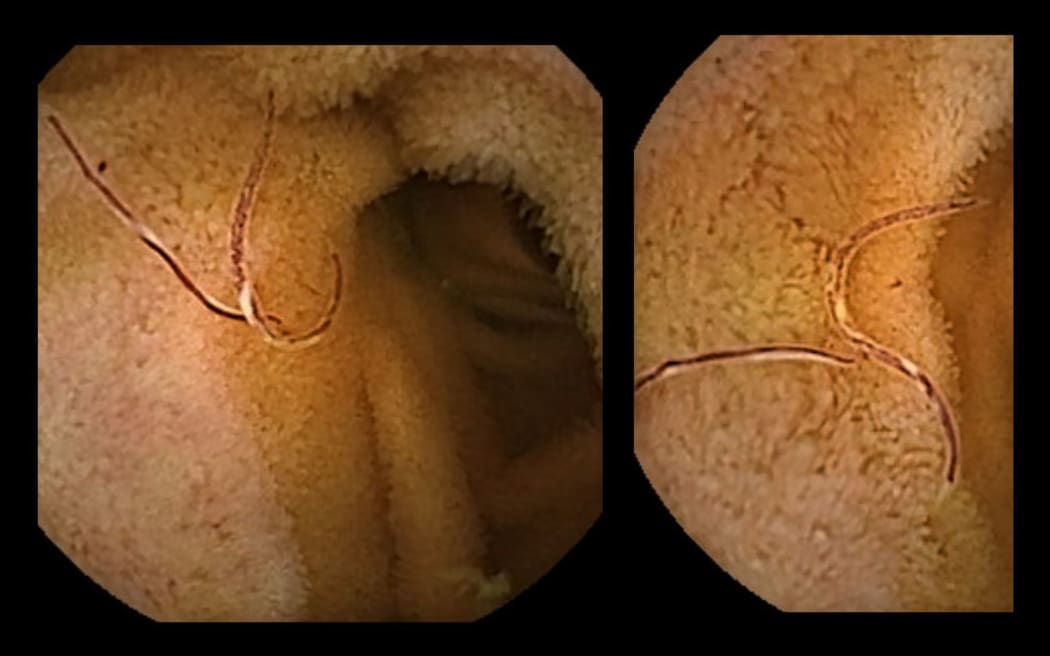
Photographs of hookworms in the small intestine taken with tiny pill-shaped cameras. Photo: Supplied
The results of the study are yet to be published, but Mules says the researchers have recorded promising changes in the microbiome and state of immune cells of participants. Importantly, it proves the Malaghan Institute's method of infecting people is successful, and that small numbers of hookworms aren't detrimental to their human host.
There's a range of ideas about how hookworms help humans. One theory is that hookworms release compounds which dampen the body's immune response just enough for the worms to stay alive, but not enough to make their meal ticket defenceless. An analogy might be installing pet-friendly motion sensors on a house alarm: the alarm can still detect a burglar, but a pint-sized pooch can happily scamper about without setting off the siren.
This could mean small things, like dust mites, pollen, or pet hair, might not trigger an allergic response.
Mules has just published a feasibility study on the effect of hookworms in people with ulcerative colitis, an inflammatory bowel disease. His study tests the waters of how to run a larger study to see if hookworms can be used as an "infect and forget" method to manage the condition and reduce unpleasant flare-ups.
The results didn't give a clear signal of whether the method could be effective (unlikely in a small study of only 20 people), but did show a larger study is feasible. Participants' immune systems did switch from a very active state to a "control" state, which he says is good for the disease. But the effect is subtle, and may not be enough to cure or manage disease, Mules says. "Even though we have seen these interesting changes, maybe they're not strong enough to put someone in remission, like a very powerful conventional drug."
Mules says the team is now wondering whether a low-level hookworm infection might be better as a preventative measure for people with a family history of the disease, rather than a treatment.
He concedes this might be a hard sell. "Telling someone, you might have a five percent chance of getting a disease, but we're going to infect you with something or give you a therapy before it develops - that's a tricky thing."
Larger studies to prove the therapy is beneficial would be needed, "but I think that's where things are heading".

Dr Tom Mules Photo: Supplied
Mules says research is happening for other conditions. In Australia, researchers from James Cook University have looked at whether hookworms can stop type 2 diabetes from forming in people at high risk of the disease. A small group of participants infected with 20 or 40 hookworms or given a placebo were tracked for two years.
The group that received 20 hookworms appeared to benefit the most, recording a clinically significant reduction in insulin resistance and returning their insulin resistance levels to a normal range 18 months after infection. The improvement for participants who are given 40 hookworms was smaller, and those given a placebo recorded worse insulin resistance levels at the end of the 12 months of study.
While the results are promising, the study had limitations. It was small, and limited in diversity, with caucasian females making up 75 percent of participants. The authors suggest a larger, longer study with a more diverse range of participants would be worthwhile.
The study also recorded an unexpected side-effect: happiness. The infected participants reported feeling more positive than the placebo group, surprising the researchers given the study started close to the beginning of the Covid-19 pandemic. At the end of the two-year study, all participants, bar one, opted to keep their worms.
When Williams joined the New Zealand study of healthy people, he was given a "kill pill" to take if he ever decides he doesn't want his hookworms. He's never taken the worming medication and as far as he knows his worms are still alive.
He feels affection toward them now. To his friends, he jokes about his "pet worms".
"I just found it kind of curious to know that there are these spindly little worms living inside me."

